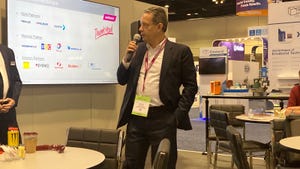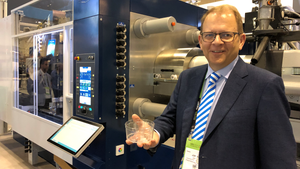Investing for the future
May 1, 1997
|
|
Stepco started out in molding by building its own plunger molding machines in 1950 (left). Today, it's a $26 million molder investing to meet present and future customer demands. |
Custom molders often get into the business in unusual ways. Try this one on for size: Stepco Corp. (Arlington Heights, IL), once called the Steel and Electrical Product Co., started out by building injection molding machines. John M. Wyle, 79, a cigar smoker who says he will think about retiring in 11 years, is Stepco's chairman and CEO.
"We were doing defense work in 1950, precision engineering, and I had an engineer who was interested in this new injection molding process," Wyle recalls. "One thing led to another, and we wound up building a 1-oz plunger machine that could run automatically with no people. The machine worked fine. The problem was that materials at that time weren't consistent. We built 10 of the machines by 1952, and got into the molding business, but we hadn't decided yet whether or not to start selling the machines. Ultimately, we found out it cost about the same to build, operate, and maintain the small machines as it did to buy them."
Today, Stepco, with average annual sales of $26 million, is a UL-certified, world-class manufacturer of futuristic, thin-wall consumer electronics products, like cellular telephones and detection and medical devices. Typically, its part wall thicknesses hover around .030 to .018 inch. Part tolerances are generally held to within +/-.002 to +/-.005 inch. Total rejects come in at less than 1 percent.
Stepco employs 120 people and operates 25 machines at its Arlington Heights facility, ranging from 80 to 550 tons, and coming from JSW, Sandretto, Kawaguchi, and Milacron. It also operates 10 more machines at a second plant in Streamwood, IL, which was brought onstream in 1994. Machines are equipped with Conair Harmo robots, HFA and MAC conveyors, centralized Conair loaders in most cases, and Matsui dryers.
Altogether, the company consumes about 7 million lb of plastic per year, mostly engineering thermoplastics. In fact, it's said that Stepco is one of GE Plastics' largest customers for PC. It uses about 300,000 lb of PC alone each year. Fortunately, materials today are much more consistent than in the old days.
Robert J. Wille, a 20-year molding veteran, became Stepco's president five years ago. Both he and Wally Mohammed, Stepco's new plant manager, have been aggressively investing into modernizing the company and restructuring it to meet continuing customer demands on quality, delivery, and price. Output has been increased by 500 percent.
Last year the company put a 30 percent capacity increase into place at its highly automated 75,000-sq-ft plant in Arlington Heights. Included in this expansion was the creation of in-house toolbuilding capabilities, with new Okamoto grinders, and a brand-new Matsuura CNC machining center that will enable the company to produce prototype tooling in short lead times. It's all part of the company's plan to become a true, full-service, contract manufacturing firm. Stepco even offers design assistance services, with Pro/E, Unigraphics, and AutoCad workstations.
At any given time, Stepco has about 350 active molds, involving some five to six mold changes a day. Comprehensive barcoding helps, but a key $180,000 investment Stepco made not too long ago keeps production and virtually everything else in the plant under control. It's the IQ-Genesis real-time manufacturing software system from IQ Management Systems Inc. (Paso Robles, CA). It automates everything from quote preparation to production monitoring to shipping, and has become a company cornerstone.
"It's absolutely comprehensive and it's constantly being upgraded to do more. I was virtually computer illiterate when I came here. Now, I couldn't imagine being without this system," says Mohammed. "It even does our capacity planning. It calculates how many real-time hours it will take to complete the project, cycles, start date, end date, delivery date - it even determines which is the best molding machine to use for the job, picks the schedule, and puts it in. I can even look at the screen and see when any one of our associates has clocked in and out. The entire plant is wired." There are 32 PCs running IQ-Genesis at Stepco today.
As in many molding plants, Stepco believes its true cornerstone is its people. The youngest foreman at the plant has been there for 10 years, and some operators have been with the company for 35. A stock ownership plan affords its associates the opportunity to share in the company's growth. All of its sales staff, increased by 100 percent since Wille took over the reins, are technically proficient and well- versed in tool design and molding. The staff can even offer customers suggestions on part design for easier manufacturability. Shop-floor associates, working in three shifts, six to seven days a week, are fully empowered to take the decision making from top management to the shop floor.
Stepco has its sights set on the future. Plans call for ISO registration soon, even though Mohammed already runs the shop like an ISO-based plant. Further expansion plans are in the works in the Arlington Heights area - possibly combining both the Arlington Heights and Streamwood facilities under one roof and adding assembly - and the company is also "looking South." Stepco plans on entering into new markets, like medical disposables, and into new technologies, like insert molding. It plans to bring its engineering plastics thin-wall molding expertise into new markets.
It plans to standardize on all its equipment over time, and is looking at QMC systems right now. Stepco also plans to get into fast, six- to eight-week prototype tooling, using its new grinders, its CNC machining center, and EDM. However, it has no plans to start building molding machines again. Lighting up a cigar and smiling, Wyle says, "You must change with the times."
You May Also Like




